By Stephanie E. Effevottu, World BEYOND War, September 21, 2022
Lead Author: Stephanie E. Effevottu
Project Team: Jacob Anyam; Ruhamah Ifere; Stephanie E. Effevottu; Blessing Adekanye; Tolulope Oluwafemi; Damaris Akhigbe; Lucky Chinwike; Moses Abolade; Joy Godwin; and Augustine Igweshi
Project Mentors: Allwell Akhigbe and Precious Ajunwa
Project Coordinators: Mr Nathaniel Msen Awuapila and Dr Wale Adeboye Project Sponsor: Mrs Winifred Ereyi
Acknowledgements
The team will like to acknowledge Dr Phil Gittins, Mrs Winifred Ereyi, Mr Nathanial Msen Awuapila, Dr Wale Adeboye, Dr Yves-Renee Jennings, Mr Christian Achaleke, and other persons who made this project a success. We also express our gratitude to the World Beyond War (WBW) and the Rotary Action Group for Peace for creating the platform (Peace Education and Action for Impact) for us to build our peacebuilding capacities.
For more information and inquiries, contact the lead author, Stephanie E. Effevottu at: stephanieeffevottu@yahoo.com
Executive Summary
Although school kidnapping is not a new phenomenon in Nigeria, since 2020, the Nigerian state has witnessed an increased rate of kidnapping of schoolchildren especially in the northern part of the country. The attendant insecurity has led to the closure of over 600 schools in Nigeria due to fear of attacks by bandits and kidnappers. Our Strengthening Youth, Community Actors and Security Forces Collaboration to mitigate School Kidnapping project exists to address the high wave of kidnapping of students in recent times. Our project also seeks to enhance the relationship between the police and young people to mitigate the incidents of school kidnappings.
This policy brief presents the findings of an online survey conducted by the World Beyond War (WBW) Nigeria team to ascertain public perception about school kidnapping in Nigeria. The findings from the survey indicate that factors such as grinding poverty, rising unemployment, ungoverned spaces, religious extremism, fundraising of terrorist operations as the major causes of school kidnapping in the country. Some impacts of school kidnapping identified by the respondents include the fact that it leads to the recruitment of armed group out of schoolchildren, poor quality of education, loss of interest in education, truancy among students, and psychological trauma, among others.
To curb school kidnapping in Nigeria, respondents agreed that it is not the job of one person or one sector but rather it needs a multi-sectoral approach, with collaborations among various stakeholders, including the security agencies, community actors, and young people. To strengthen young people’s capacity to reducing school kidnapping in the country, the respondents stated that there is need to implement mentorship programmes and coaching/early response teams for students across the various educational institutions. Increased security in schools, sensitisation and awareness campaigns, as well as community policy were also parts of their recommendations.
In order to build effective collaboration between the Nigerian government, young people, civil society actors, and security forces towards reducing issues of school kidnapping in the country, respondents suggested setting up local teams to ensure collaboration, providing security that stays accountable, organising community policy, conducting school to school sensitisation campaigns, and conducting dialogue with the various stakeholders.
Respondents however noted that there is a lack of trust between the youths and the other stakeholders, particularly the security forces. They therefore recommended several trust building strategies, some of which include the use of creative art, educating young people on the role of the various security agencies, educating stakeholders on the ethics of trust, as well as building a community around trust building activities.
There were also recommendations on better empowerment for the various security agencies especially by providing them with better technology and state-of-the art weapons to deal with these kidnappers. Finally, recommendations were made on the ways through which the Nigerian government can ensure that schools are safe for students and teachers.
The policy brief concludes by stating that school kidnapping is a menace to the Nigerian society, with the high rate in recent times negatively affecting education in the country. It therefore calls on all stakeholders, as well as the national and international communities to better collaborate to curtail this threat.
Introduction/Overview of School Kidnapping in Nigeria
Like most concepts, there is no single definition that can be ascribed to the term ‘kidnapping’. Several scholars have provided their own explanation on what kidnapping means to them. For example, Inyang and Abraham (2013) describes kidnapping as the forceful seizure, taking away, and illegal detention of a person against his/her will. Similarly, Uzorma and Nwanegbo- Ben (2014) defines kidnapping as the process of snatching and confining or carrying away a person by illicit force or by fraud, and mostly with a request for ransom. Fage and Alabi (2017) terms kidnapping as the fraudulent or forceful abduction of an individual or a group of individuals for motives ranging from socio-economic, political, and religious, amongst others. Despite the multiplicity of definitions, what they all have in common include the fact that kidnapping is an unlawful act that often entails the use of force with the motive of getting money or other gains.
In Nigeria, the breakdown of security has led to an upsurge of kidnapping especially in the northern part of the country. Although kidnapping has been an ongoing practice, it has taken a new dimension with these kidnappers leveraging on public horror and political pressures to demand for payoffs that are more profitable. Furthermore, unlike in the past where kidnappers mainly target wealthy people, criminals now target people of any class. The current forms of kidnapping are mass abduction of students from school dormitories, abduction of students on highways and in rural and urban areas.
With almost 200,000 primary and secondary schools, the Nigerian education sector represents on the largest in Africa (Verjee and Kwaja, 2021). Although school kidnapping is not a new phenomenon in Nigeria, in recent times, there has been a high spate of kidnapping of students for ransom from educational institutions particularly secondary schools across northern Nigeria. The first of these mass kidnapping of school students can be traced to 2014 when the Nigerian government reported that the Boko Haram terrorist groups kidnapped 276 schoolgirls from their dormitory in the north-eastern town of Chibok, Borno State (Ibrahim and Mukhtar, 2017; Iwara, 2021).
Prior to this time, there have been attacks and killings of school students in Nigeria. For example, in 2013, forty-one students and one teacher were burnt alive or shot at the Mamufo Government Secondary School in Yobe State. In that same year, forty-four students and teachers were murdered at the College of Agriculture in Gujba. In February 2014, fifty-nine students were also killed at the Buni Yadi Federal Government College. The Chibok kidnapping followed in April 2014 (Verjee and Kwaja, 2021).
Since 2014, there have been the kidnapping of over 1000 schoolchildren for ransom by criminal gangs across northern Nigeria. The following represents a timeline a school kidnapping in Nigeria:
- April 14, 2014: 276 schoolgirls were kidnapped from the Government Girls Secondary School in Chibok, Borno State. Although most of the girls have since been rescued, others have been killed or are still missing until date.
- February 19, 2018: 110 female students were kidnapped from the Government Girls Science Technical College in Dapchi, Yobe State. Most of them were released weeks later.
- December 11, 2020: 303 male students were kidnapped from Government Science Secondary School, Kankara, Katsina State. They were freed a week later.
- December 19, 2020: 80 students were taken from an Islamiyya school in Mahuta town, Katsina State. The police and their community self-defence group quickly freed these students from their kidnappers.
- February 17, 2021: 42 persons, including 27 students were kidnapped from the Government Science College, Kagara, Niger State, while one student was killed during the attack.
- February 26, 2021: About 317 female students were abducted from the Government Girls Science Secondary School, Jangebe, Zamfara State.
- March 11, 2021: 39 students were kidnapped from the Federal College of Forestry Mechanisation, Afaka, Kaduna State.
- March 13, 2021: There was an attempted attack at the Turkish International Secondary School, Rigachikun, Kaduna State but their plans were foiled due to a tip-off received by the Nigerian army. That same day, the Nigerian army was also rescued 180 people, including 172 students from the Federal School of Forestry Mechanisation in Afaka, Kaduna State. A combined effort of the Nigerian army, police, and volunteers also prevented the attack on the Government Science Secondary School, Ikara in Kaduna state.
- March 15, 2021: 3 teachers were snatched from UBE Primary School in Rama, Birnin Gwari, Kaduna State.
- April 20, 2021: At least 20 students and 3 staff were abducted from Greenfield University, Kaduna State. Their abductors killed five of the students while the others were freed in May.
- April 29, 2021: About 4 students were kidnapped from the King’s School, Gana Ropp, Barkin Ladi, in Plateau State. Three of them later escaped from their captors.
- May 30, 2021: About 136 students and several teachers were kidnapped from the Salihu Tanko Islamic School in Tegina, Niger State. One of them died in captivity were the others were freed in August.
- June 11, 2021: 8 students and some lecturers were kidnapped at Nuhu Bamali Polytechnic, Zaria, Kaduna State.
- June 17, 2021: At least 100 students and five teachers were kidnapped from Federal Government Girls College, Birnin Yauri, Kebbi State
- July 5, 2021: Over 120 students were abducted from Bethel Baptist High School, Damishi in Kaduna State
- August 16, 2021: About 15 students were kidnapped from the College of Agriculture and Animal Health in Bakura, Zamfara State
- August 18, 2021: Nine students were abducted on their way home from the Islamiyya School in Sakkai, Katsina State.
- September 1, 2021: About 73 students were kidnapped from Government day Secondary school in Kaya, Zamfara State (Egobiambu, 2021; Ojelu, 2021; Verjee and Kwaja, 2021; Yusuf, 2021).
The issue of student kidnapping is widespread across the country and poses a worrying development in the country’s kidnap-for-ransom crisis, with negative implications for the education sector. It is a problem because it puts students’ education in jeopardy in a country with very high rates of out-of-school children and dropout rates, especially the girl-child. Moreover, Nigeria is in danger of generating a ‘lost generation’ of school-age children who lose out on education and consequently future opportunities to thrive and drive themselves and their families out of poverty.
The impact of the school kidnappings is multifaceted and leads to the emotional and psychological trauma for both parents and schoolchildren of those kidnapped, economic decline due to heightened insecurity, which negates foreign investment, and political instability because the kidnappers make the state ungovernable and attract infamous international attention. This problem therefore needs a multi-stakeholder approach driven by young people and security forces to nip it in the bud.
Project Purpose
Our Strengthening Youth, Community Actors and Security Forces Collaboration to mitigate School Kidnapping exists to address the high spate of kidnapping of students in recent times. Our project seeks to enhance the relationship between the police and young people to mitigate the incidents of school kidnappings. There has been a gap and breakdown of trust between young people and the security forces especially the police as seen during the #EndSARS protests against police brutality in October 2020. The youth-led protests were brought to a brutal end with the Lekki Massacre of October 20, 2020 when the police and military opened fire on defenceless youth protesters.
Our innovative youth-led project will focus on creating bridges between these groups to transform their adversarial relationships into collaborative ones that will mitigate school kidnappings. The purpose of the project is to bring youth, community actors and security forces to collaborate in mitigating the issue of school kidnapping for ransom. This negative trend requires a collaborative approach to ensure the security of youth in school and defend their right to learn in a safe and secure environment. The goa of the project is to strengthen the collaboration of youth, community actors and security forces to mitigate school kidnappings. The objectives are to:
- Strengthen the capacity of youth, community actors and security forces to mitigate school kidnapping.
- Foster collaboration between youth, community actors and security forces through dialogue platforms to mitigate school kidnapping.
Research Methodology
To strengthen youth, community actors, and security forces collaboration to mitigate school kidnapping in Nigeria, the World Beyond war Nigeria team decided to conduct an online survey to get the perception of the general public about the causes and impact of school kidnapping and their recommendations on the way forward towards making schools safe for students.
An online close-ended quantitative 14-item structured questionnaire was designed and made available to participants through a Google form template. Preliminary information about the project was provided for participants at the introductory section of the questionnaire. Personal details such as name, phone number and email address were made optional to ensure participants that their responses were confidential and they are free to opt out from feeling sensitive information that may infringe on their rights and privileges.
The online Google link was circulated to participants through various social networking platforms like WhatsApp of the WBW Nigerian team members. There was no target age, gender, or population for the study as we left it open for everyone because school kidnapping is a threat to all irrespective of age or gender. At the end of the data collection period, 128 responses were gotten from individuals across the various geopolitical zones in country.

The first part of the questionnaire focuses on soliciting answers to the personal information of the respondents such as name, email address, and phone number. This was followed by questions on the age range of the participants, their state of residence, and whether they live in states affected by school kidnapping. Of the 128 participants, 51.6% were between the ages of 15 and 35; 40.6% between 36 and 55; while 7.8% were 56 years and above.
Furthermore, of the 128 respondents, 39.1% reported that they live in states affected by school kidnapping; 52.3% replied in the negative, while 8.6% stated that they do not know if their state of residence is among states affected by issues of school kidnapping:
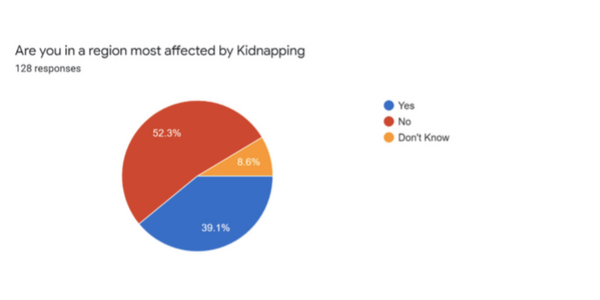
Research Findings
The following section presents the findings from the online survey conducted with 128 respondents from various regions in the country:
Causes of School Kidnapping in Nigeria
Since December 2020 until date, there have been over 10 cases of mass kidnapping of schoolchildren especially in the northern part of the country. Research conducted by scholars across various fields indicate that there are several motivations for kidnapping ranging from socio-economic and political to cultural and ritual purposes, with each of these factors mostly interwoven. The study findings gotten suggests that factors such as unemployment, abject poverty, religious extremism, the presence of ungoverned spaces, and the growing insecurity are the major causes of school kidnapping in Nigeria. Thirty-two percent of the respondents stated fundraising of terrorist operations to be one of the major causes for the recent upsurge of school kidnapping in Nigeria.
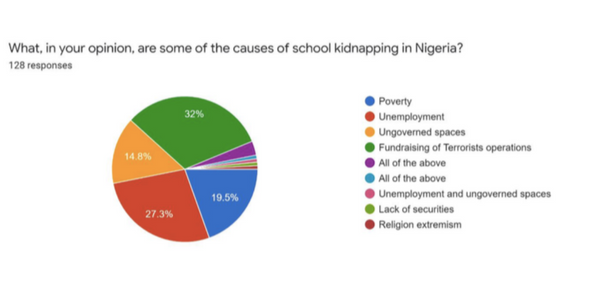
Likewise, 27.3% highlighted unemployment to be another cause of school kidnapping in Nigeria. Similarly, 19.5% stated that poverty represents another cause for poverty. In addition, 14.8% highlighted the presence of ungoverned spaces.
Impact of School Kidnapping and School Closure on Education in Nigeria
The importance of education in a multi-cultured society like Nigeria cannot be over emphasised. However, quality education has on several occasion, been threatened and sabotaged by the menace of kidnapping. The act that originated from the Niger Delta region of the country, has sadly, fast risen to become the business of day in almost every region of the country. A lot of concern has emerged of recent on the impact of school kidnapping in Nigeria. This ranges from parent’s concern over insecurity, to youths being lured into the ‘lucrative’ business of kidnapping causing them to deliberately stay away from schools.
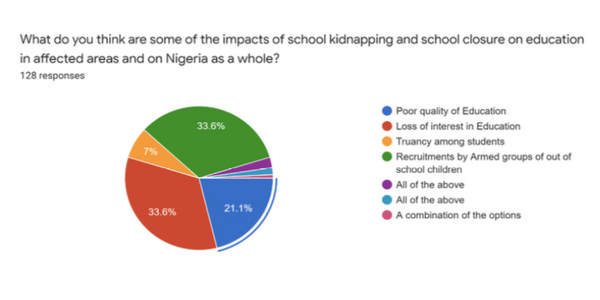
This is reflective in the responses of the conducted survey as 33.3% of the respondents agrees that kidnapping results to pupils’ loss of interest in education, also, another 33.3% of the responses agrees to its impact on poor quality of education. Often times, when kidnappings happen in schools, schoolchildren are either sent home, or withdrawn by their parents, and in some extreme cases, schools remain shut down for months.
The most damaging impact it has is when students are idle, they tend to be lured into the act of kidnapping. The perpetrators entice them in such a way that, they present the “business” as a lucrative one to them. It is obvious from the rise in the number of young people involved in school kidnappings in Nigeria. Others impacts could include psychological trauma, initiation to cultism, being a tool in the hands of certain elites as thugs, mercenaries for some politicians, introduction to diverse forms of social vices such as drug abuse, gang raping, etc.
Policy Recommendations
Nigeria is becoming largely insecure such that nowhere is safe anymore. Be it in the school, church, or even private residence, citizens are constantly at risk of being victims of kidnapping. Nevertheless, respondents were of the opinion that the current upsurge of school kidnapping has made it difficult for parents and guardians in the affected region to continue sending their children/wards to school for fear of them being kidnapped. Several recommendations were provided by these respondents to help address the causes of kidnapping as well as proffer solutions for reducing such practices in Nigeria. These recommendations tasked both young people, community actors, security agencies, as well as the Nigerian government on the various measures that they can take towards fighting school kidnapping:
1. There is need to strengthen young people’s capacity to work towards reducing school kidnapping in Nigeria:
Young people constitute more than half of the world population and as such, they also need to be involved in decisions that affect the country. With the prevalence of school kidnapping across various parts of the country and with the negative impacts it has on the youth demographic, they need to be fully involved in proffering solutions to tackling this menace. In line with this, 56.3% suggests the need for increased security in schools and more sensitisation and awareness campaign for young people. Likewise, 21.1% proposes the creation of community police especially in areas prone to these attacks. In a similar vein, 17.2 percent recommended the implementation of mentorship programmes in schools. Furthermore, 5.4% advocated for the creation of coaching and early response team.
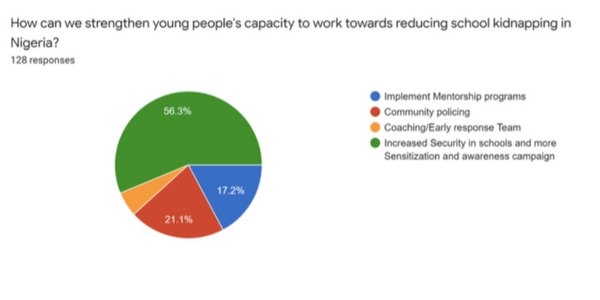
2. There is the need to foster collaboration between the Nigerian government, young people, civil society actors, and security forces towards reducing issues of school kidnapping in Nigeria:
In order to build effective collaboration between the Nigerian government, young people, civil society actors, and security forces towards reducing issues of school kidnapping in the country, 33.6% suggested setting up of local teams to ensure collaboration between the various stakeholders. In a similar vein, 28.1% recommended community policing made up various stakeholders and training them on how to respond to these issues. Another 17.2% advocated for dialogue among the various stakeholders. Other recommendations include ensuring accountability among all the stakeholders.
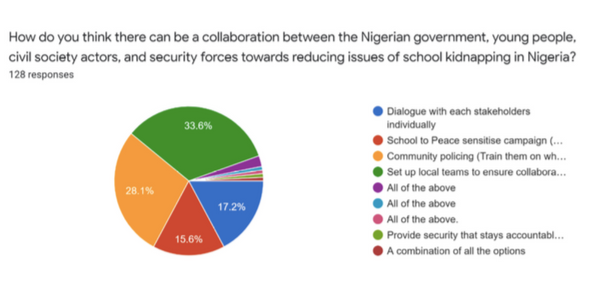
3. There is a need to build trust between young people and the various security agencies in Nigeria:
Respondents noted that there is a lack of trust between the youths and the other stakeholders, particularly the security forces. They therefore recommended several trust building strategies, some of which include the use of creative art, educating young people on the role of the various security agencies, educating stakeholders on the ethics of trust, as well as building a community around trust building activities.
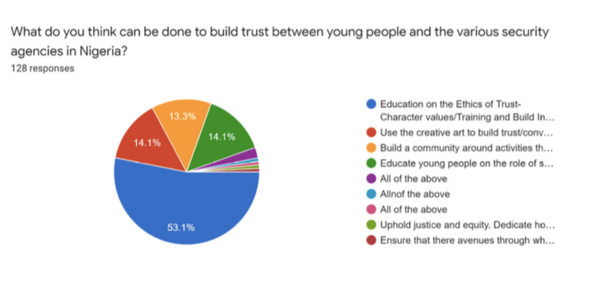
4. The Nigerian security forces need to be better empowered to tackle kidnapping in Nigeria:
The Nigerian government need to support the various security agencies by providing them with all the necessary equipment and resources that they need to deal with these kidnappers. 47% of respondents proposed that the government should provide improved use of technology in their operations. In the same vein, 24.2 % advocated for capacity building for members of the security forces. Likewise, 18% stated that there is proposed that there is need to build collaboration and trust among the security forces. Other recommendations included the provision of sophisticated ammunition for the security forces. There is also the need for the Nigerian government to increase the funds allocated to the various security agencies to better motivate them to do their work.
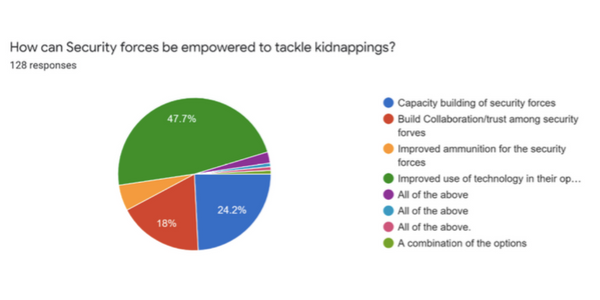
5. What do you think the government can do to improve security for schools and ensure that they are safe for students and teachers?
Unemployment and poverty have been identified as some of the cause of school kidnapping in Nigeria. 38.3% of the respondents suggested that the government should provide sustainable employment and social welfare of its citizens. Participants also noted the loss of moral values among citizens thus 24.2% of them advocated for better collaboration between faith leaders, private sector, and academia in sensitisation and awareness creation. 18.8% of the respondents also noted that school kidnapping in Nigeria is becoming very rampant because of the presence of so many ungoverned spaces thus the government should make effort to protect such spaces.
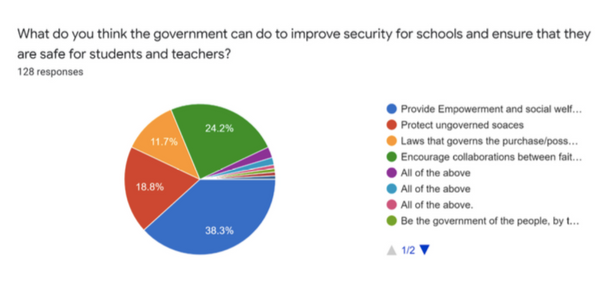
Conclusion
School kidnapping is on the increase in Nigeria and it is dominant especially in the northern part of the country. Factors such as poverty, unemployment, religion, insecurity, and the presence of ungoverned spaces were identified as some of the causes of school kidnapping in Nigeria. Coupled with the ongoing insecurity in the country, the upsurge of school kidnapping in the country has led to reduced trust in the Nigerian education system, which had further increased the number of out-of-school students. There is therefore the need for all hands to be on deck to prevent school kidnapping. Young people, community actors, and the various security agencies must work together to proffer permanent solutions to stopping this menace.
References
Egobiambu, E. 2021. From Chibok to Jangebe: A timeline of school kidnappings in Nigeria. Retrieved on 14/12/2021 from https://www.channelstv.com/2021/02/26/from-chibok-to- jangebe-a-timeline-of-school-kidnappings-in-nigeria/
Ekechukwu, P.C. and Osaat, S.D. 2021. Kidnapping in Nigeria: A social threat to educational institutions, human existence, and unity. Development, 4(1), pp.46-58.
Fage, K.S. & Alabi, D.O. (2017). Nigerian government and politics. Abuja: Basfa Global Concept Ltd.
Inyang, D.J. & Abraham, U.E. (2013). The social problem of kidnapping and its implications on the socio-economic development of Nigeria: A study of Uyo metropolis. Mediterranean journal of social sciences, 4(6), pp.531-544.
Iwara, M. 2021. How mass kidnappings of students hinder Nigeria’s future. Retrieved on 13/12/2021 from https://www.usip.org/publications/2021/07/how-mass-kidnappings-students- hinder-nigerias-future
Ojelu, H. 2021. Timeline of abductions in schools. Retrieved on 13/12/2021 from https://www.vanguardngr.com/2021/06/timeline-of-abductions-in-schools/amp/
Uzorma, P.N. & Nwanegbo-Ben, J. (2014). Challenges of hostage-taking and kidnapping in the South-eastern Nigeria. International Journal of Research in Humanities, Arts and Literature. 2(6), pp.131-142.
Verjee, A. and Kwaja, C.M. 2021. An epidemic of kidnapping: Interpreting school abductions and insecurity in Nigeria. African Studies Quarterly, 20(3), pp.87-105.
Yusuf, K. 2021. Timeline: Seven years after Chibok, mass kidnapping of students becoming norm in Nigeria. Retrieved on 15/12/2021 from https://www.premiumtimesng.com/news/top- news/469110-timeline-seven-years-after-chibok-mass-kidnapping-of-students-becoming- norm-in-nigeria.html
Ibrahim, B. and Mukhtar, J.I., 2017. An analysis of the causes and consequences of kidnapping in Nigeria. African Research Review, 11(4), pp.134-143.








